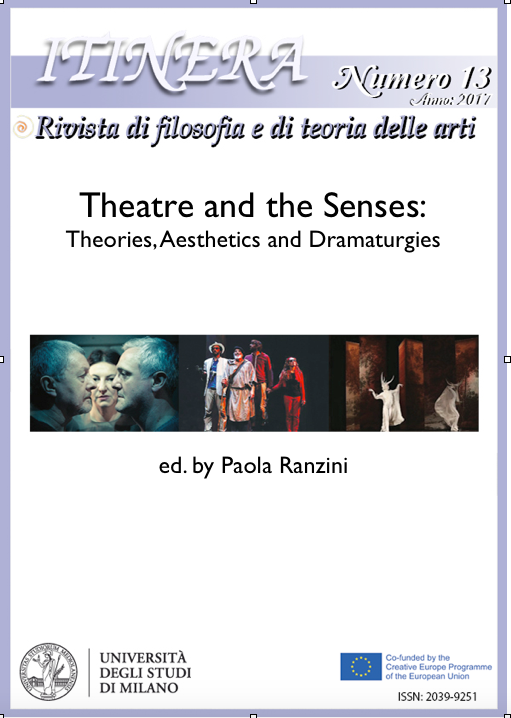Tweetre: What role can technology play in contemporary theatre?
DOI:
https://doi.org/10.13130/2039-9251/8738Abstract
This article is a brief, individual review which illustrates some advances that digital technology can foster for theatre. Whether this can be seen as an encroachment or augmentation in this field, there are clear examples of significant opportunities for practitioners who follow the digital route as a means to increase theatrical participation. Concurrent to this, this article will demonstrate the validity of using the principles of game design to consider the potentials offered by digital theatre and indicate possible avenues for future research.
Downloads
Riferimenti bibliografici
AUSLANDER, Philip, “Postmodernism and Performance”, The Cambridge Companion to Postmodernism, ed. Steven Connor, Cambridge University Press, Cambridge 2004.
- Liveness: Performance in a Mediatized Culture, Routledge, Oxon 1999.
-“Just Be Your Self”: Logocentrism and Difference in Performance Theory”, in Acting Reconsidered: A Theoretical and Practical Guide, 2nd edition, ed. ZARILLI Philip B, Routledge, London 2002.
CARLIN, J. “The end game of Bobby Fischer”, The Observer, Published: Sunday 10 February 2008 Accessed October 2016. Available at: https://www.theguardian.com/sport/2008/feb/10/chess.usa
CAIRD, Jo, “When theatre goes digital” in www.thespace.org. Published June 2015, Accessed October, 2016. Available at: https://www.thespace.org/news/when-theatre-goes-digital
DERRIDA, Jacques, « Structure, Sign, and Play », Writing and Difference (1966), Tr. Alan Bass, University of Chicago Press, Chicago 1978.
DG COMM “RESEARCH AND SPEECHWRITING” UNIT, European Commission, Directorate-General for Communication CULTURAL ACCESS AND PARTICIPATION REPORT, Published November 2013. Accessed 23rd October, 2016. Available at: http://ec.europa.eu/public_opinion/archives/ebs/ebs_399_en.pdf
GREGORY, J. “P. W. Botha, Defender of Apartheid, Is Dead at 90”, The New York Times, November 1st 2006. Accessed 21st October, 2016. Available at: http://www.nytimes.com/2006/11/01/world/africa/01botha.html?_r=0
HARPER, Douglas, Online Etymology Dictionary, Published 2001, Accessed October, 2016. Available at http://www.etymonline.com/index.php?term=theater
HUIZINGA, Johan, Homo Ludens: A Study of the Play-Element in Culture (1949). Routledge & Kegan Paul, London 1980.
JAMESON, Fredric, Postmodernism, or The Cultural Logic of Late Capitalism, Duke University Press, Durham 1991.
KIM, J. & SONG, H. “Celebrity’s Self-Disclosure on Twitter and Parasocial Relationships: A Mediating Role of Social Presence”, March 26, 2015. Available at: https://ssrn.com/abstract=2756744 orhttp://dx.doi.org/10.2139/ssrn.2756744
KINDLE HODSON, Victoria & WILLIS, Mariaemma, Discover Your Child’s Learning Style, Prima Publishing, Roseville 1999.
MCLUHAN, Marshall, The Gutenberg Galaxy: the making of typographic man, Faber and Faber, London 1962.
SMITH, R. “About Theatre Delicatessen”, Accessed October, 2016. Available at: http://theatredelicatessen.co.uk/about/
SOLON, O. “Is our world a simulation?”, The Guardian. Published: 11th October, 2016. Accessed 21st October, 2016. Available at: https://www.theguardian.com/technology/2016/oct/11/simulated-world-elon-musk-the-matrix
STANISLAVSKI, Konstantin, My Life in Art, Routledge, London 1974.
ULLMANN, Stephen, The principles of Semantics, B. Blackwell, Oxford 1967.
WILDER, Thornton, “Some thoughts on Playwriting”, The Intent of the Artist, ed. Augusto CENTENO, Princeton University Press, Princeton 1941.
ZIMMERMAN, Eric & SALEN, Katie, Rules of Play: Game Design Fundamentals, MIT Press, London 2004.
Dowloads
Come citare
Fascicolo
Sezione
Licenza
Gli autori che pubblicano su questa rivista accettano le seguenti condizioni:
1. Gli autori mantengono i diritti sulla loro opera e cedono alla rivista il diritto di prima pubblicazione dell'opera, contemporaneamente licenziata sotto una Licenza Creative Commons - Attribuzione - Condividi allo stesso modo 4.0 internazionale che permette ad altri di condividere l'opera indicando la paternità intellettuale e la prima pubblicazione su questa rivista.
2. Gli autori possono aderire ad altri accordi di licenza non esclusiva per la distribuzione della versione dell'opera pubblicata (es. depositarla in un archivio istituzionale o pubblicarla in una monografia), a patto di indicare che la prima pubblicazione è avvenuta su questa rivista.
3. Gli autori possono diffondere la loro opera online (es. in repository istituzionali o nel loro sito web) prima e durante il processo di submission, poiché può portare a scambi produttivi e aumentare le citazioni dell'opera pubblicata (Vedi The Effect of Open Access).





